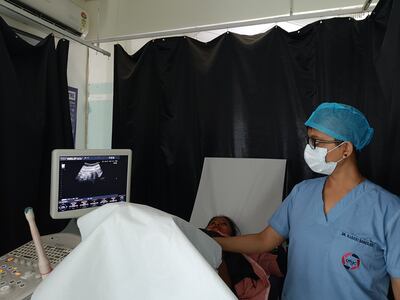Seven months after their only daughter died during the coronavirus pandemic, Indian couple Sabu Thomas and Jean George were hoping to fill a void through surrogacy.
But their dreams of having a child have hit a dead end under India’s new surrogacy laws, aimed at regulating the country’s once booming rent-a-womb industry that earned it the sobriquet of “world’s baby factory”.
Mr Thomas, 52, and Ms George, 47, from Pathanamthitta in southern Kerala state, lost their 20-year-old daughter Nova Sabu in August to brain hemorrhage, caused by what they claim was an adverse reaction to the Covid-19 vaccine.
“What is life without a child? We have lost our precious daughter. We need a baby who will give us hope to continue living and ease this pain,” Mr Thomas told The National.
The couple began the search for a surrogate mother soon after the death of their daughter, as Ms George had reached menopause and has been diagnosed with breast cancer.
But their efforts to find a volunteer surrogate who could bear the couple a child in a largely conservative society have failed as the new rules prohibit women from renting their wombs for money.
“We are facing difficulties, we are searching … even if a woman is interested, the community or family will oppose,” Mr Thomas said.
Surrogacy is a medical procedure in which a man’s sperm and a woman’s eggs are fertilised in a lab and the embryo is then implanted in the uterus of a surrogate mother who carries and gives birth to the baby.

India legalised surrogacy in 2002. Within a decade, the medical procedure became a multi-million-dollar industry – a mixed bag for childless couples amid allegations of exploitation of surrogates – before Prime Minister Narendra Modi’s government passed the new law last year.
The Surrogacy (Regulation) Act 2021 was passed in December and made “altruistic surrogacy” mandatory to curb exploitation of women for commercial gains.
The law limits the medical procedure to couples who are infertile and have been married for at least five years, with no surviving offspring.
It also mandates the eligible ages to between 26 and 55 for the husband and 23 to 50 for the wife.
A couple can only sponsor the medical expenses of the surrogate, who should be married and between 25 and 35 years of age.
Towards the end of the 2010, thousands of low-cost fertility clinics sprouted across the country, mainly in western Gujarat where infertile couples, including foreigners with dreams of having children, flocked looking for a cheap route to parenthood.
Thousands of children born through surrogacy
By 2012, India had a thriving $2 billion surrogacy industry, figures compiled by the Confederation of Indian Industry show. At least 25,000 children were born through surrogacy in the same year.
The cost of surrogacy ranged between $18,000 to $30,000, of which about $8,000 went to the surrogate mother.
India had up to 3,000 unregulated clinics until 2019, government figures showed.
But the booming industry was hit in 2015 when the government banned surrogacy for foreigners over several cases where couples abandoned the surrogate babies due to laws in their native countries.
The incidents sparked a debate on overhauling the surrogacy laws amid claims that the industry was exploiting poor and vulnerable women.
Experts had largely welcomed the laws but gave warnings that the strict caveats could hit genuine couples like Mr Thomas and Ms George, who are struggling to find a volunteer surrogate in a country where discussions around fertility still remain a taboo.
Dr Kaberi Banerjee, who runs Advanced Fertility Centre in the capital Delhi, said many childless couples are struggling to find surrogates after the new laws were passed.
“These women [surrogates] until now had the financial motive as they were making a reasonable sum of money that helped them educate their children or buy property,” Dr Banerjee told The National.

“The government feels that women should come out of their volition to carry the child for another couple. It is an honourable step, but I don’t think it is practical because it is difficult to carry someone’s child to term unless you’re really motivated,” she said.
Dr Banerjee said it is difficult to find a woman who would willingly become a surrogate in India, where topics such as infertility assisted reproductive technology are often not discussed.
About 10 to 14 per cent of Indians are infertile, as per the Indian Society of Assisted Reproduction, but many of them never seek medical intervention.
“Infertility remains inside the bedroom. Society doesn’t allow the discussion on basic fertility procedures such as IVF openly. Who is going to talk about bringing friends, family, relatives or other women for surrogacy?” Dr Banerjee said.
“I think it is going to be extremely difficult to motivate anybody to carry someone’s child."
The new laws have also come under criticism from experts, who say they discriminate against unmarried or same-sex couples.
G Hari Ramasubramanian, chief consultant at Indian Surrogacy Law Centre, a legal consultancy firm specialising in surrogacy and fertility laws, said the legislation flouts the basic rights to reproductive choices, making surrogacy exclusive to married couples.
“The laws have put in place restrictions that are unacceptable,” Mr Ramasubramanian told The National. "This is an area that needs a progressive approach rather than trying to constrain rights."


